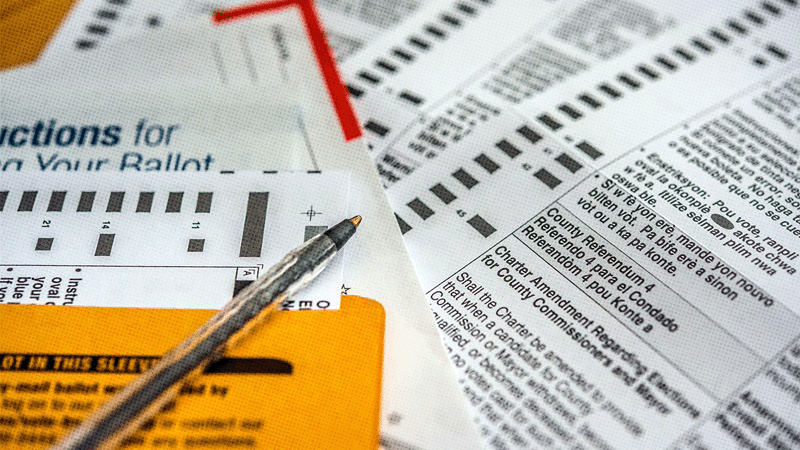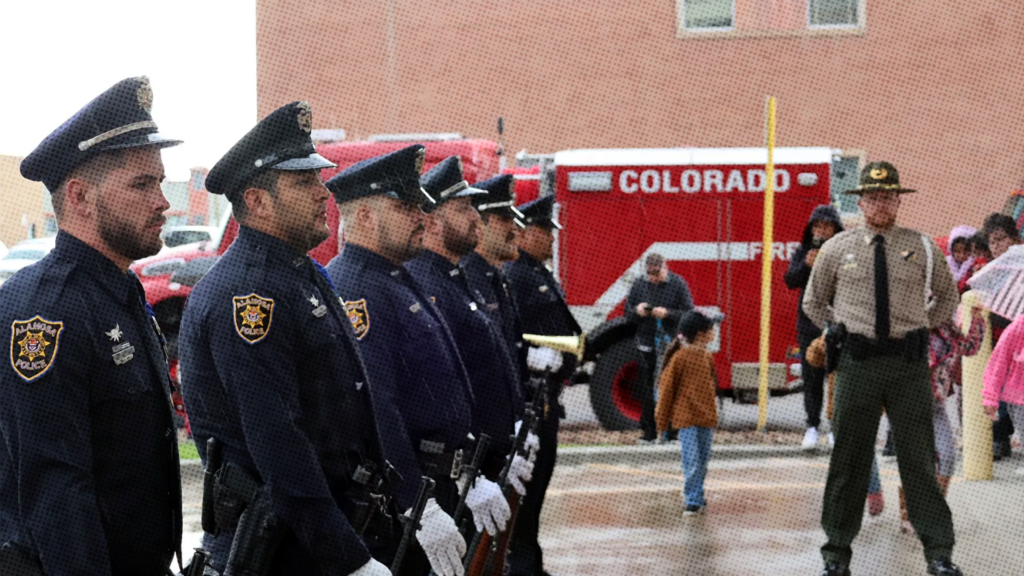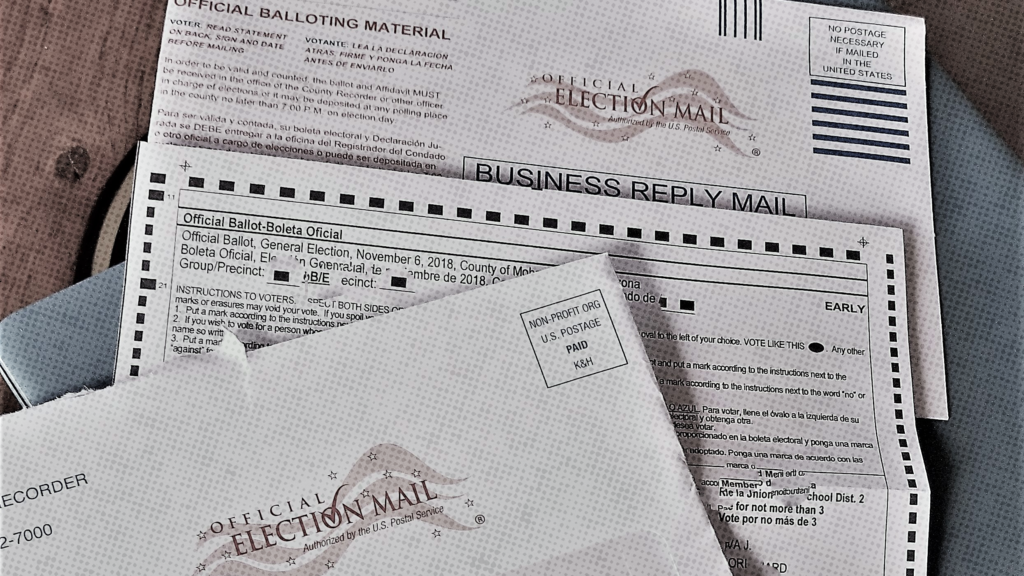
👋 Welcome!
2024 Ballot Guide
The Bell Policy Center’s 2024 ballot guide is the result of Bell staff research and analysis, providing you clear arguments in favor and against each of the statewide questions on the ballot.
The statewide questions on the November ballot are varied and important, ranging from expanding the homestead exemption for disabled veterans to putting abortion rights in the state constitution.
This ballot guide is the result of research and analysis by Bell staff, who have examined history and context to provide you clear arguments in favor and against each of the 14 questions on the ballot. For the nine measures that impact the values the Bell has identified for this ballot guide, we’ve provided recommended votes. For the remainder, we have offered facts, analysis, and pros and cons, but did not take a position.
For each measure we’re analyzing this year, you’ll see there are three values the proposals are scored on: tax fairness, racial equity, and economic mobility. We chose these three as all are closely aligned with the Bell’s work and our organizational mission. Each value receives a rating (very bad, bad, slightly bad, neutral, slightly good, good, very good) based on how the ballot measure in question will affect these values.
We know you have a lot of choices when it comes to seeking out ballot guidance, and we’re honored that you’re here.
- Amendment G: Yes ✅
- Amendment H: Yes ✅
- Amendment I: No Position
- Amendment J: Yes ✅
- Amendment: K: No Position
- Amendment 79: Yes ✅
- Amendment 80: No ❌
- Proposition JJ: Yes ✅
- Proposition KK: Yes ✅
- Proposition 127: No Position
- Proposition 128: No ❌
- Proposition 129: No Position
- Proposition 130: No ❌
- Proposition 131: No Position

Modify Property Tax for Veterans with Disabilities
We recommend a YES vote.
Summary
Amendment G makes a change to the state constitution in order to extend eligibility for the homestead exemption to veterans who have unemployability status. Currently, veterans can only qualify for the exemption if they have a service-connected disability rated as 100 percent.
Recommendation
We recommend a YES vote. The inability to maintain employment is an impediment to economic security. By extending an already existing benefit to veterans who are unable to maintain employment due to their military service, our tax code can provide some financial support to those who have sacrificed for the well-being of our country and communities.
🔑 Key Facts
- The homestead exemption is currently available to certain older adults, veterans with a disability rated as 100 percent, and Gold Star spouses. Qualifying individuals can reduce their property taxes by exempting 50 percent of the first $200,000 of the value of their home. In 2023, the homestead exemption reduced property taxes for veterans and Gold Star spouses by an average of $586.
- Unemployability status is granted by the federal Department of Veterans Affairs. To be granted this status, a veteran must be unable to hold “substantially gainful employment” due to a disability connected to their military service.
- Legislative Council estimates 3,400 additional veterans will take advantage of the exemption if expanded. This will cost the state approximately $2.1 million in FY 2025-26 and $2.8 million in FY 2026-27.
- Qualifying individuals realize the homestead exemption benefit when paying their property taxes, which are collected by local governments. The state, in turn, backfills this lost revenue by reimbursing local governments. Revenue in excess of the TABOR cap can be used to pay for the homestead exemption. However, if revenue collection for the year is below the TABOR limit, the state must use General Funds to cover reimbursements to local communities.
✏️ Scorecard
Tax Fairness
GOOD
This measure uses our tax code to provide a targeted benefit to individuals who have made tremendous sacrifices for our collective well-being.
Racial Equity
NEUTRAL
It’s unclear how this measure would directly impact BIPOC Coloradans, or bridge income and wealth inequalities.
Economic Mobility
GOOD
The inability to secure meaningful employment harms economic mobility and security. Amendment G provides some support to mitigate these challenges.
👍 Arguments For
- The homestead exemption is already available to a subset of veterans facing financial challenges resulting from their military service. Expanding the exemption to a similar set of veterans is a natural extension of current policy.
- Veterans who have lost the ability to work due to their time in the military have made tremendous sacrifices for the benefit of our communities. Though small in comparison to their sacrifice, expanding the homestead exemption to these individuals offers them at least some financial assistance and recognition of their sacrifice.
Supporters: Rep. Bob Marshall (D), Sen. Rhonda Fields (D), Sen. Perry Will (R)
👎 Arguments Against
- Especially in years when the benefit must be paid for through the state’s General Fund, adopting this measure will reduce support for other priorities like education, health care, and transportation. Concerningly, due to TABOR, Colorado is already currently unable to meet many ongoing obligations.
Opponents: None to date

Judicial Discipline Procedures and Confidentiality
We recommend a YES vote.
Summary
Amendment H changes the state constitution by creating an independent board to conduct formal judicial discipline hearings and determine sanctions. Once formal charges are filed against a judge, information about the board’s proceedings would become public. The board would be composed of citizens, attorneys, and judges appointed by the Colorado Supreme Court and Governor to five-year terms. While the complainant would be kept informed and updated throughout the process, their information would also be kept confidential.
Recommendation
We recommend a YES vote. Amendment H works to ensure Colorado’s judicial system is more accountable, transparent, and responsive. As Coloradans of color are disproportionately impacted by the judicial system, these improvements have the potential to increase racial equity and economic mobility.
🔑 Key Facts
- Currently, judicial misconduct cases are reviewed by the Colorado Commission on Judicial Discipline. Members of the commission include judges, lawyers, and citizens. The commission can decide to dismiss a complaint, privately discipline the judge, hold an informal hearing, or recommend a formal hearing. Formal hearings are conducted by judges, who are selected by the Colorado Supreme Court. Upon conducting these formal hearings, a disciplinary recommendation is submitted to the Supreme Court. Only after this process is complete, and only if the judge receives a public punishment, is the case made public and information shared with the complainant.
- Language for this amendment was unanimously approved by Colorado’s Legislative Interim Committee on Judicial Discipline.
- The purpose of judicial discipline processes, as explained by the Judicial Center on Ethics, is to “maintain and restore public confidence in the integrity, independence, and impartiality of judges and the judicial system…”
- According to the National Center for State Courts, Colorado is one of only 15 states where the initial hearing is confidential and only becomes public once a recommendation for discipline is filed.
- Approximately 200 complaints are made to the Commission on Judicial Discipline each year. About 90 percent of complaints made are dismissed for procedural reasons and 10 percent are reviewed to decide whether to discipline the judge and whether to do it publicly or privately.
- In 2023, judges were publicly disciplined for reasons such as verbal abuse toward attorneys, mishandling of public contracts, and inappropriate sexual contact with lawyers.
✏️ Scorecard
Tax Fairness
NEUTRAL
This proposition does not change or alter state or local tax codes.
Racial Equity
GOOD
People of color are disproportionately impacted by the judicial system. A more impartial and accountable judicial system will benefit these Coloradans.
Economic Mobility
GOOD
A well functioning judicial system can have positive impacts on homeownership rates and can help close the racial wealth gap. This amendment would help facilitate these positive impacts by making the judicial system more responsive and accountable.
👍 Arguments For
- This amendment makes the judicial disciplinary process more transparent and accountable. It does this, in part, by creating a formal review process that is not solely in the hands of judges, who are currently charged with evaluating their peers. The changes in this amendment can lead to greater trust in the judicial process among Coloradans, all the while maintaining necessary confidentiality.
Supporters: Rep. Mike Lynch (R), Rep. Mike Weissman (D), Sen. Bob Gardner (R ), Sen. Jullie Gonzales (D)
👎 Arguments Against
- Judges are well positioned and trained to hear and review cases impartially. This process should not be turned over to citizens and attorneys who do not have the same expertise or understanding of the judicial system.
- The judicial system already has a system of check and balances to ensure fairness, therefore this new process is not needed.
Opponents: None to date

Constitutional Bail Exception First Degree Murder
NO POSITION
Summary
Amendment I changes the state constitution by making first-degree murder an offense for which the accused is not allowed to post bail when the “proof is evident and the presumption is great” standard is met.
Recommendation
Because the measure does not impact the values the Bell Policy Center has identified for our ballot guide, we do not offer a position on the measure.
🔑 Key Facts
- Colorado’s constitution prevents individuals from posting bail if they are charged with a crime that may be punishable by death, so long as the “proof is evident and the presumption is great” standard is met. In 2020, state lawmakers abolished the death penalty. This, in turn, allowed individuals charged with all crimes to post bail.
- First degree murder involves any of the following: deliberation with the intent to kill; acting with extreme indifference for human life in a way that causes another to die; distributing a controlled substance to a person under 18, on school grounds, which causes that person to die; or knowingly causing the death of a child under 12 if one is in a position of trust and respect to the victim.
- “Proof is evident and the presumption is great” is a legal standard. Meeting this standard requires additional processes and evidence. Prior to the abolition of the death penalty, the state constitution prevented those charged with capital crimes from posting bail if this standard was met.
✏️ Scorecard
Tax Fairness
NEUTRAL
This proposition does not change or alter state or local tax codes.
Racial Equity
NEUTRAL
It’s unclear how this measure would directly impact BIPOC Coloradans, or bridge the income and wealth inequalities that exist.
Economic Mobility
NEUTRAL
This measure neither promotes nor undermines economic mobility in a significant manner. It does not clearly contribute to redressing socioeconomic disparities that exist in the state.
👍 Arguments For
- When lawmakers abolished the death penalty, they unintentionally removed the bail exemptions for capital offenses. This amendment simply addresses this unintended consequence and once again makes certain crimes non-bailable.
- Allowing individuals who are charged with a serious offense, and where the evidence against them is significant, to post bail endangers community safety. These safety concerns are especially heightened for friends and family of the victim.
Supporters: House Majority Leader Monica Duran (D), Rep. Mike Lynch (D), Sen. Rhonda Fields (D), Sen. Bob Gardner (R)
👎 Arguments Against
- This measure creates two types of first-degree murder defendants: those who are allowed to post bail and those who are not. This division, particularly for those who are unable to post bail, may prejudice the jury and prevent a fair trial.
- Bail is set very high for first degree murder. Though amounts vary from case to case, in recent instances, bonds were set at least $2 million cash. As a result of these high amounts, very few people charged with first degree murder are able to post bail. This, in turn, limits the need for additional changes to the state constitution.
Opponents: None to date

Repealing the Definition of Marriage in the Constitution
We recommend a YES vote.
Summary
Amendment J repeals a section of the Colorado Constitution that states that marriage is between a man and a woman.
Recommendation
We recommend a YES vote. The freedom to marry for same sex partners provides economic benefits and familial protections important for economic mobility. Ensuring this freedom at the state level guarantees these benefits will be protected no matter any political changes at the federal level.
🔑 Key Facts
- In 2006, Colorado voters passed Amendment 43, which prohibits the recognition of same sex marriage in Colorado.
- The 2015 U.S. Supreme Court ruling in Obergefell v. Hodges found that same sex marriage is protected under the Equal Protection Clause of the 14th Amendment. Therefore, all states must now recognize same sex marriages.
- Prior to the U.S. Supreme Court decision that protects same sex marriage, people in same sex partnerships were less likely to have health insurance. While employer sponsored health insurance plans often extend coverage to spouses, same sex partners were not afforded this benefit.
- Legally recognized marriage affords couples the right to important benefits such as spousal Social Security and exemptions from estate taxes if their spouse passes away.
- In states that legalized same sex marriage, same sex couples have been found to have higher earnings, increased rates of homeownership, better health, and lower levels of psychological distress.
✏️ Scorecard
Tax Fairness
GOOD
While Amendment J does not change the tax code, it would ensure same sex couples have the same tax advantages as opposite sex couples if the Supreme Court were to reverse the Obergefell decision.
Racial Equity
NEUTRAL
It’s unclear how this measure would directly impact BIPOC Coloradans, or bridge income and wealth inequalities.
Economic Mobility
GOOD
Amendment J grows economic mobility for same sex partnerships by increasing access to health insurance, home ownership, social benefit programs, and tax advantages. This measure is particularly important for older LGBTQ adults who, prior to the U.S. Supreme Court ruling, experienced economic insecurity when their partner passed because they were not afforded the same family protections as opposite sex couples.
👍 Arguments For
- The reversal of Roe v. Wade demonstrated that the U.S. Supreme Court can overturn prior decisions. While current federal law recognizes same sex marriage, it is important to also protect same sex marriage at the state level, especially if there are federal reversals.
- Same sex marriage grants people in same sex partnerships equal benefits and familial protections as those in opposite sex partnerships. This has a positive impact on their economic well-being.
Supporters: Freedom to Marry Colorado, One Colorado, COLOR, New Era Colorado, Planned Parenthood of the Rocky Mountains, Rep. Brianna Titone (D), Rep Alex Valdez (D), Sen. Joann Ginal (D)
👎 Arguments Against
- Federal law already protects same sex marriage, therefore this constitutional measure is unnecessary.
Opponents: None to date

Modify Constitutional Election Deadlines
NO POSITION
Summary
Amendment K changes the state constitution by adjusting certain deadlines to provide county clerks with additional time to format, review, and translate ballots. The adjusted deadlines include requiring the following to be submitted one week earlier: signatures for some citizen-initiated referendums and initiatives, and declarations from judges seeking another term.
Recommendation
Because the measure does not impact the values the Bell Policy Center has identified for our ballot guide, we do not offer a position on the measure.
🔑 Key Facts
- Currently, county officials face short turnaround times from when election information is certified by the Colorado Secretary of State’s Office to when ballots must be completed. Deadlines for county clerk offices are largely driven by the need to send ballots to military and overseas voters no later than 45 days before the election.
- Throughout the past several years, Colorado’s ballots have increased in length and complexity. This can be attributed to factors such as growth in the number of special districts and new requirements, such as the provision of ballot materials in multiple languages.
✏️ Scorecard
Tax Fairness
NEUTRAL
This proposition does not change or alter state or local tax codes.
Racial Equity
NEUTRAL
This proposition will have no impact on BIPOC Coloradans, nor would it bridge the income and wealth inequalities that exist.
Economic Mobility
NEUTRAL
This measure neither promotes nor undermines economic mobility in a significant manner. It does not clearly contribute to redressing socioeconomic disparities that exist in the state.
👍 Arguments For
- Providing county officials an additional week to create and format ballots will increase the probability that election materials are clear and correct. In doing so, this measure can strengthen Coloradans’ trust in government.
Supporters: Senate President Steve Fenberg (D), Sen. Byron Pelton (R), Rep. Kyle Brown (D), Rep. Lisa Frizell (R), Colorado County Clerks Association
👎 Arguments Against
- This measure reduces the amount of time some Coloradans will have to submit signatures for citizen-initiated measures. This could diminish the ability of Coloradans to impact state policy.
Opponents: None to date

Constitutional Right to Abortion
We recommend a YES vote.
Summary
Amendment 79 makes abortion a constitutional right in the state of Colorado. It also repeals language from the constitution that bans the use of public funding for abortions. If passed, the amendment would allow the option for the state of Colorado to offer abortion access through either Medicaid or state/local government employee insurance. If Amendment 79 passes, decisions regarding the use of public funds for abortions would be contingent upon approval by state and local policymakers.
Recommendation
We recommend a YES vote. Economic mobility is tied to the ability to decide when and how many children a person will have. Importantly, using public funds to support this choice will provide greater access for women with lower incomes and who are women of color, as they are more likely to use state-supported healthcare.
🔑 Key Facts
- In 1984, Amendment 3 was narrowly passed by Colorado voters and effectively prohibited the use of public funds by the state, any of its agencies, or political subdivisions, to pay for abortions.
- In 2022, the Colorado legislature passed the Reproductive Health Equity Act (RHEA), making abortion statutorily legal.
- In 2022, the United States Supreme Court Dobbs v. Jackson decision effectively reversed the 1973 Roe v. Wade decision, which held that the federal Constitution protects the right to an abortion. This 2022 decision therefore left regulation of abortion to the states.
- Colorado is one of nine states that does not have a ban or gestational limit on abortion access.
- Research shows that restricted access to abortion increases a pregnant person’s likelihood of living in poverty and reliance on public assistance. Conversely, access to abortion has been shown to increase labor force participation and one’s likelihood of earning a degree.
- Seventeen states direct Medicaid funds to pay for all or most medically necessary abortions.
- Although data is limited on the impact of Medicaid funding for abortion, one study found that using public funds to pay for an abortion would result in cost savings for prenatal, delivery services, and welfare supports.
- Women of color are disproportionately likely to use Medicaid. Women, and specifically Black women, are also more likely to work for state or local governments.
✏️ Scorecard
Tax Fairness
NEUTRAL
This proposition does not change or alter state or local tax codes.
Racial Equity
GOOD
Repealing the ban on the use of public funds for abortion services would have an important impact on women of color. Women of color are more likely to rely on Medicaid and insurance from state/local governments and therefore face disproportionate barriers in accessing abortion care if the use of public funds are restricted.
Economic Mobility
GOOD
Access to abortion impacts a person’s economic well-being. Allowing the use of public funds would particularly impact low-income women’s access to abortion as they are more likely to rely on public health insurance. By allowing public funds to be used for abortion services, low-income women will have greater access, improving their economic mobility.
👍 Arguments For
- When Roe v. Wade was overturned, abortion access was left to the states. Protecting the right to an abortion in the Colorado Constitution ensures access to abortion regardless of political changes at the federal level.
- Abortion access improves public health and well-being. As such, state policymakers should have the ability to support abortion access with public dollars.
- Protecting abortion access in Colorado ensures women can make their own choices about what is right for their reproductive and financial health.
Supporters: Coloradans for Protecting Reproductive Freedom, Colorado Cobalt Advocates, New Era Colorado, ProgressNow Colorado, League of Women Voters
👎 Arguments Against
- Some people oppose abortions for personal and religious reasons. The government should not be using taxpayer money to pay for these services that some find morally objectionable.
- State law already allows for abortion access. This constitutional measure is unnecessary and may make it harder to regulate abortions in the future.
Opponents: Pro-Life Colorado

Constitutional Right to School Choice
We recommend a NO vote.
Summary
Amendment 80 affirms the right to school choice in the Colorado Constitution for children in kindergarten through 12th grade and creates the constitutional right for parents to make decisions about the education of their children. The amendment defines school choice as inclusive of public and private schools, charter schools, home schools, open enrollment options, and any future innovations in education.
Recommendation
We recommend a NO vote. By making school choice a constitutional right, this measure may create a risk that public funds could be directed to private schools, where students are more likely to be white and wealthy. Colorado already faces below national average funding levels for public K-12 education. If public funding is directed to private schools, this would likely reduce funding available for public schools. This would negatively impact public school students, who are disproportionately from communities of color, and may lead to worse learning outcomes.
🔑 Key Facts
- Currently, Colorado state law allows for school choice. Students may attend any public school, which includes charter schools, regardless of what school district they live in, though policies on this can vary by school district. State law does allow parents to choose other options like private school or home schools. However, private schools and home schools cannot receive public funding.
- Making school choice a constitutional right calls into question whether the state could continue to prohibit the use of public funds for private education.
- Charter schools are public schools, but unlike district-run public schools, they are overseen by independent boards of directors and can be exempt from certain rules. Charter schools have flexibility in curriculum, but are assessed by the same statewide tests as other public schools in Colorado.
- Private schools or home schools are not under the jurisdiction of the State Board of Education or any local board of education and therefore allow for more customizable teaching, including religious instruction.
- Of the approximately 1 million Colorado children who are between ages 4 and 18, 82 percent, or 881,464, are enrolled in public PK-12 schools.
- Nationally, higher percentages of private school students are white compared to public school students. Conversely, only 9 percent of private school students are Black, compared to 15 percent of public school students. Twelve percent of private school students are Hispanic and Latino compared to 28 percent of public school students.
- Colorado public schools have long faced budget challenges. Budget shortfalls over the past two decades have resulted in program cuts, lower academic support, and salary freezes. Research shows that funding cuts are linked to poorer outcomes for students.
- Quality K-12 education, which is linked to funding levels, is an important factor for upward economic mobility. K-12 education prepares students for work or continued education.
- A handful of states including Arizona, Ohio, and Wisconsin allow public funding to be used on private education through a voucher system. The majority of the vouchers are being used at religious private schools, blurring the separation of church and state. For example, in Ohio, 91 percent of voucher money went to private religious schools. In Wisconsin, 96 percent of vouchers were used at private religious schools.
- Private school voucher systems can siphon money away from public schools. This happens when a family chooses to attend private school, and those funds are redirected away from public schools.
✏️ Scorecard
Tax Fairness
NEUTRAL
This amendment does not change the state or local tax codes.
Racial Equity
SLIGHTLY BAD
This measure may be a stepping stone for public funds to be used for private education, which would reduce the funding available for public school students. This could result in larger classroom sizes and program cuts, all of which impact the learning outcomes for students in public schools. Using public funds toward private education would disproportionately impact those in the public school system, who are disproportionately from communities of color.
Economic Mobility
SLIGHTY BAD
Access to abortion impacts a Education is widely recognized as a lever for economic mobility. Decreasing the funds for public K-12 education has negative impacts on learning outcomes for students, which in turn affect students’ future success in work and school.
👍 Arguments For
- Parents are best suited to make decisions about their child’s education and decide what learning environment is best. Amendment 80 guarantees that school choice is a constitutional right for children and parents and ensures that no future political changes will impact school choice.
Supporters: Advance Colorado
👎 Arguments Against
- Colorado law already allows parents to choose between public, private or home schools. Making school choice a constitutional right calls into question whether the state could continue to prohibit the use of public funds for private education. If public funding were to be redirected toward private schools, this would likely have a disproportionately adverse impact on students from communities of color.
Opponents: Colorado Education Association, Great Education Colorado

Retain Additional Sports Betting Revenue
We recommend a YES vote.
Summary
Proposition JJ allows the state to keep all of the taxes and fees on sports gambling that were passed in 2019 with Proposition DD. The revenue would be used to fund the Colorado Water Plan.
Recommendation
We recommend a YES vote. The additional money retained through this measure is desperately needed to conserve and sustain water sources in Colorado. Projects funded with these dollars will help communities deal with the effects of drought, population growth, and a warming climate. This, in turn, will support more sustainable communities and ensure Coloradans can work where they live, and thrive.
🔑 Key Facts
- In 2019, voters passed Proposition DD, which legalized sports betting in Colorado. As part of this initiative, taxes and fees were levied on sports gambling. The majority of this new revenue was earmarked for projects that are part of the Colorado Water Plan. Smaller amounts of money from Proposition DD went toward other purposes, such as gambling addiction support.
- When doing fiscal projections for Proposition DD, Legislative Council Staff estimated that the state, in its first year, would collect $29 million from taxes on sports betting. This is $1.2 million less than what was actually collected. TABOR requires voter approval for the retention of any revenue above initial projections for ballot measures. This is now at least the third time in the past decade where voters have been asked, because of TABOR, to reapprove funds from an already voter-approved revenue increase. This was the case for both marijuana and nicotine revenue.
- If Proposition DD is not approved, $1.2 million will be returned to sports betting operators.
- The Colorado Water Plan was created by the Colorado Water Conservation Board in 2015, with input from experts, stakeholders, and residents. It requires $3 billion in funding from 2020 through 2050 to create a more sustainable water model that protects land, agriculture, wildlife, and water-dependent industries. It is also meant to provide clean and safe drinking water for all Colorado residents.
- In the month of June 2024, there was over $350 million of sports betting activity in Colorado, leading to $1.8 million in tax revenue for the state.
✏️ Scorecard
Tax Fairness
NEUTRAL
This amendment does not change the state or local tax codes.
Racial Equity
NEUTRAL
According to studies, most sports gamblers are white men, with a disproportionate number making more than $100,000 annually in income. Furthermore, this measure does not change the underlying legalization or taxation of sports betting.
Economic Mobility
SLIGHTLY GOOD
Putting additional money toward water conservation, even in the relatively small amounts under this measure, will help communities produce sustainable water solutions. Taking this action will create more robust economic opportunities for Colorado residents and communities.
👍 Arguments For
- The Colorado Water Plan needs an estimated annual appropriation of $100 million from 2020 through 2050. The money from Proposition JJ is just a fraction of what is needed to make our water sources and projects sustainable as population increases and the climate gets hotter. However, every bit counts and these additional funds could be the difference between certain projects being completed. Moreover, the only people helped if this initiative fails are sports gambling operators.
- Voters already approved the legalization and taxing of sports betting for water projects. Approving Proposition JJ follows the will of the voters.
Supporters: Sen. Dylan Roberts (D), Sen. Bob Gardner (R), House Speaker Julie McCluskie (D), Rep. Marc Catlin (R), Conserve and Protect Our Water
👎 Arguments Against
- Voters only approved $29 million from sports betting for water projects. We should be able to live within the means prescribed by the original initiative, not increase government spending.
- None of the additional dollars set aside through Proposition JJ will go to support those who suffer from gambling addiction. At least some of the additional money, retained through Proposition JJ, should go to support those Coloradans hurt by the legalization of sports betting.
Opponents: Colorado Gaming Association

Firearms and Ammunitions Excise Tax
We recommend a YES vote.
Summary
This measure creates a new 6.5 percent sales tax on sales of firearms, firearm parts, and ammunition. The revenue collected from the tax will fund crime victim support services, veterans’ mental health services, school safety programs, and youth behavioral health services.
Recommendation
We recommend a YES vote. Due to reductions in federal funding for victim services and long-standing budget constraints that have led to underfunding of veteran and youth behavioral health services, there is an unmet need. As Colorado struggles to keep up with the needs of communities across Colorado, it is important to find new and innovative streams of funding to protect investments in programs across the state. With an excise tax that has a clear nexus to the services being funded, this is a logical way to create new revenue. Pumping $39 million into the above-mentioned services, which are lifelines to countless Coloradans, deserves support from voters.
🔑 Key Facts
- Since 1919, there has been a federal tax of 10 percent on handguns and 11 percent on all other firearms and ammunition. That is in addition to state and local sales taxes in Colorado that apply to most goods, including firearms and ammunition.
- The Victims of Crime Act (VOCA) was passed by Congress in 1984 and distributes money to states and organizations supporting victims. The money that is distributed through VOCA comes from fines paid by people convicted of federal crimes.
- VOCA funding has been cut in half since 2018, leading to fewer resources for organizations and governments within Colorado that provide victim services. In fiscal year 2024-25, total VOCA funding for all states was reduced by $700 million, which equates to an approximately 40 percent cut in total allocations.
- Colorado had been using one-time money from the American Rescue Plan Act to plug some of the holes. With that money no longer available, and decreases in VOCA funding, it is estimated that Colorado will see a 40 to 50 percent decrease in funding available for victim services in 2025.
- Approximately 70 percent of intimate partner homicides are committed with a firearm.
- According to the Department of Veterans Affairs, Colorado has a higher rate of suicide among veterans than the national average.
- It is estimated that Proposition KK will raise $39 million in the first full year of its enactment. That is based on projections that there will be approximately $600 million in firearms, ammunition, and firearm part sales.
- If Proposition KK passes, a $550 handgun would cost an extra $35.75 in taxes and $20 of ammunition would cost an extra $1.30.
✏️ Scorecard
Tax Fairness
VERY GOOD
Though excise taxes can be regressive, Proposition KK increases tax fairness by clearly connecting the funding stream to specific purposes and projects.
Racial Equity
VERY GOOD
Gun violence disproportionately impacts underrepresented communities, especially Black communities. By increasing funding for victim services, Proposition KK can help bolster the well-being of traditionally marginalized communities.
Economic Mobility
VERY GOOD
Victims of crime can face a number of lifelong traumas that may hamper their ability to feel safe and find steady employment. These issues can, in turn, limit economic mobility. The victim services funded by Proposition KK can mitigate these challenges.
👍 Arguments For
- Gun violence causes individual and community harm. Taxing the weapons and ammunition used to commit this violence makes sense in order to provide the necessary services that victims require. The clear nexus between the funding source and what it supports makes this a logical tax.
- With funding for victim support and mental health services decreasing substantially, there is a critical need to find new revenue streams to address these important needs. The reduction or cessation of these services would be devastating for individuals harmed by violence and the communities plagued by gun crimes. Providing a sustainable source of funding for these programs will allow organizations to provide services to help people in their communities.
- Voters already approved the legalization and taxing of sports betting for water projects. Approving Proposition JJ follows the will of the voters.
Supporters: Violence Free Colorado, The Women’s Foundation of Colorado, Colorado Victims for Justice, League of Women Voters of Colorado, Colorado Nurses Association, Mental Health Colorado, Majority Leader Monica Duran (D), Rep. Meg Froelich (D), Sen. Janet Buckner (D), Sen. Chris Hansen (D)
👎 Arguments Against
- Firearm crimes are committed by a very small percentage of gun owners. Law-abiding gun owners should not be responsible for funding the services needed by communities across Colorado. If victim services are an important statewide need, then lawmakers should prioritize them in the state budget, and not rely primarily upon gun owners.
- Many guns are purchased for self defense and protection. Proposition KK may make purchasing guns and ammunition prohibitively expensive, in turn placing some Coloradans in danger. Additionally, this proposition may force more guns to be purchased out of state, hurting businesses or encouraging a robust black market for guns.
Opponents: National Rifle Association, Rocky Mountain Gun Owners, Congressional Sportsmen’s Foundation

Prohibit Bobcat, Lynx, and Mountain Lion Hunting
NO POSITION
Summary
Proposition 127 defines and prohibits big cat trophy hunting. Under this initiative, the intentional killing, wounding, entrapping, or pursuing of a mountain lion, bobcat or lynx is prohibited, with exceptions for the defense of human life, livestock, property, or motor vehicles.
Recommendation
Because the measure does not impact the values the Bell Policy Center has identified for our ballot guide, we do not offer a position on the measure.
🔑 Key Facts
- Bobcats and mountain lions are not considered threatened or endangered species and their populations are stable in Colorado. There are no estimates of bobcat population size in the state, and there are an estimated 3,800-4,400 mountain lions in Colorado.
- Lynx, also known as Canada Lynx, are considered endangered in Colorado and threatened nationally. While their population in Colorado is stable, they are protected by current state and federal law, and it is illegal to hunt or trap them.
- Bobcats can be hunted with a hunters’ education certificate obtained through Colorado Parks and Wildlife (CPW), and a furbearer’s license. There are no limits on how many bobcats can be hunted.
- Mountain lions can be hunted with the same hunter’s education certificate, and an additional Mountain Lion Education certificate. CPW has regulations on where, when, and how mountain lions can be hunted, and the agency has to inspect all hunted mountain lions.
- About 900 bobcats were hunted annually from 2020-2023. Over the same time period, 500 mountain lions were hunted annually.
- Under current law, landowners are entitled to reimbursement from the state for any damage to property, crops, livestock, fencing, and other personal property from “big game” animals, which currently includes mountain lions. Under this measure, mountain lions would no longer be considered “big game.” As a result, land owners would no longer be eligible for state reimbursement due to mountain lion damage.
✏️ Scorecard
Tax Fairness
NEUTRAL
This proposition does not change or alter state or local tax codes.
Racial Equity
NEUTRAL
This proposition will have no impact on BIPOC Coloradans, nor would it bridge the income and wealth inequalities that exist.
Economic Mobility
NEUTRAL
This measure neither promotes nor undermines economic mobility in a significant manner. It does not clearly contribute to redressing socioeconomic disparities that exist in the state.
👍 Arguments For
- Mountain lions, bobcats, and lynx do not require hunting or trapping to stabilize their populations. These animals are important ecological actors and Colorado should not encourage hunting these species for sport. If there is future need for population control, federal and state wildlife experts can do the work necessary to keep their populations in check.
Supporters: Colorado Humane Society, Colorado Sierra Club, Center for Biological Diversity, WildEarth Guardians, Cats Aren’t Trophies
👎 Arguments Against
- Hunting is an important sport for many Coloradans. Those who do the work to get the proper licensing and follow the rules and regulations laid out by Colorado Parks and Wildlife should not be punished because of the beliefs of those who do not hunt.
- This measure restricts the ability for Coloradans to obtain proper monetary reimbursement for damage done to their livestock or property by these animals. Current regulations work well for the vast majority of Coloradans and there is no need to move to prohibition.
Opponents: National Wildlife Federation, Theodore Roosevelt Conservation Partnership, Colorado Outfitters Association, Backcountry Hunters & Anglers, Colorado’s Wildlife Deserve Better

Parole Eligibility for Crimes of Violence
We recommend a NO vote.
Summary
Proposition 128 requires those who commit, and are convicted of, certain crimes of violence on or after July 1, 2025 to serve at least 85 percent of their sentence before being eligible for parole. For these individuals, earned time can not be accumulated prior to completing 85 percent of their sentence. Individuals convicted of at least three or more crimes of violence will no longer be eligible for parole.
Recommendation
We recommend a NO vote. Requiring individuals to complete a higher percentage of their full prison sentence has not been shown to lower crime rates. Moreover, carrying out this measure will require additional state funding which, otherwise, could have been invested in public services and supports that are known to increase economic mobility.
🔑 Key Facts
- As identified by this measure, crimes of violence include second degree murder, first degree assault, class two felony kidnapping, first or second degree sexual assault, first degree arson, first degree burglary, and aggravated robbery
- Currently, those charged with the above listed crimes are eligible for parole after serving 75 percent of their sentence after earned time is applied. Earned time reduces the amount of time an inmate must serve in prison. It can be accumulated by completing personal, professional, or educational activities that will increase an inmate’s chance of success after leaving prison. Those released on discretionary parole based on meeting certain earned-time benchmarks are less likely to recidivate than those released after completion of their full sentence.
- When seeking parole, inmates must appear before the State Board of Parole. Board members are appointed by the Governor and approved by the state Senate. A professional staff of state employees assist the Board with their work.
- Legislative Council Staff estimates that this initiative will have an ongoing, annual cost of between $12 million and $28 million, as Coloradans will be imprisoned for longer periods of time. Moreover, there may be additional costs which arise from the need to build more correction facilities.
- Research shows that requiring individuals to complete a minimum percentage of their sentence does not increase public safety. By contrast, investments in reentry programs that help individuals prepare and acclimate to life post-incarceration have been shown to be effective at reducing crime.
- The Department of Corrections is currently experiencing a staffing crisis. Facilities have high turnover rates and are often challenged to recruit new correction officers. This is contributing to unsafe conditions within correctional facilities.
✏️ Scorecard
Tax Fairness
NEUTRAL
This proposition does not change or alter state or local tax codes.
Racial Equity
BAD
Coloradans of color are disproportionately impacted by the corrections system. If this measure passes, individuals who would have been eligible for early release based on achievement of earned-time benchmarks will be deprived of opportunities to resume productive roles in society.
Economic Mobility
BAD
This measure will have a significant, ongoing cost to the state General Fund. Instead of spending money on incarceration, these funds could be used for services and supports that are proven to increase economic mobility, such as health care and K-12 education.
👍 Arguments For
- This measure requires individuals convicted of some violent crimes to stay in prison for a longer period of time. While in prison, these individuals will not be able to commit another serious offense in their community. This could result in increased public safety.
Supporters: Advance Colorado
👎 Arguments Against
- Evidence does not indicate that longer incarceration times increase public safety. By contrast, other investments, such as wrap-around and reintroduction services, have been shown to be effective at achieving this goal.
- A process is currently in place to evaluate whether individuals should receive parole. The individuals making these decisions are qualified and are most knowledgeable about the specifics of individual cases. Proposition 128 reduces the discretion of these professionals.
Opponents: ACLU Colorado, Colorado Criminal Justice Reform Coalition, Colorado Freedom Fund

Establishing Veterinary Professional Associates
NO POSITION
Summary
Proposition 129 creates a new position to perform veterinary care, the veterinary professional associate (VPA). The new position would be regulated by the Colorado State Board of Veterinary Medicine, which also regulates other veterinary positions such as veterinary technicians, veterinary technician specialists, and doctors of veterinary medicine. The proposition outlines the minimum education and qualifications needed to become a VPA.
Recommendation
Because the measure does not impact the values the Bell Policy Center has identified for our ballot guide, we do not offer a position on the measure.
🔑 Key Facts
- Currently, only licensed veterinarians, a registered veterinary technician, or a registered veterinary technician specialist can provide veterinary care in Colorado. The Colorado State Board of Veterinary Medicine regulates these professions by setting rules for practice, qualifications, continuing education requirements, and disciplinary issues.
- A veterinary technician requires an associates or bachelor’s degree in veterinary technology, and a specialist requires an additional three to five years of clinical experience. Both of these positions provide assistance to licensed veterinarians in supporting dental procedures, nursing care, and treatment of minor medical conditions, with the specialist able to provide more specialized support.
- A licensed veterinarian requires an advanced doctoral degree and clinical experience. A licensed veterinarian can perform all levels of veterinary care.
- A VPA would require a master’s degree. Additional training or qualifications may be determined by the state board. A VPA may perform duties and actions that are within the scope of their advanced education and should be performed under the supervision of a licensed veterinarian. The licensed veterinarian is responsible for the VPA.
- The necessary master’s degree program to obtain VPA credential does not currently exist in Colorado; the College of Veterinary and Biomedical Sciences at Colorado State University (CSU) is working to create a program. CSU’s program would develop competencies for the new mid-level role to diagnose medical concerns, perform routine surgeries, and order and perform tests and procedures.
- Lincoln Memorial University in Tennessee is the only university in the nation to currently offer a similar program. The program, known as a Master of Veterinary Clinical Care, is a fully online master’s program. The program first started in August 2022, therefore results have yet to be seen.
- Based on 2024 data, 15 Colorado counties are identified by the USDA as having a veterinary service shortage, the majority of which are rural or frontier counties. Humane societies across the country are also struggling to hire veterinarians for necessary care due to the shortage of workers.
- The student debt-to-income ratio is one reason for the veterinary shortage, especially in rural areas where the pay is even lower compared to urban areas.
✏️ Scorecard
Tax Fairness
NEUTRAL
This proposition does not change or alter state or local tax codes.
Racial Equity
NEUTRAL
It’s unclear how this measure would directly impact BIPOC Coloradans, or bridge the income and wealth inequalities that exist.
Economic Mobility
SLIGHTLY GOOD
This proposition may help people in rural areas access necessary care for their animals by increasing the supply of veterinary professionals. This in turn has the potential to make veterinary care more affordable for animal owners, which would decrease family costs and free up financial resources that could be used in other important ways, like for housing or child care.
👍 Arguments For
- People across Colorado are struggling to access veterinary care, particularly in rural communities. Creating a new mid-level position, VPA, would increase access to veterinary care and allow licensed veterinarians to delegate tasks to VPAs. This, in turn would allow veterinarians to focus on the more complex cases.
Supporters: Animal Welfare Association of Colorado, The Humane Society of the United States, Larimer Humane Society, Humane Society of the Pikes Peak Region, All Pets Deserve Vet Care
👎 Arguments Against
- The measure’s education and training requirements are vague and no master’s degree programs currently exist for the new VPA profession in Colorado. Additionally, a two year master’s program may not provide adequate training to perform routine surgeries. Creating this new, untested profession could increase risk for animals.
Opponents: Colorado Veterinary Medical Association, American Veterinary Medical Association, Colorado Association of Certified Veterinary Technicians

Funding for Law Enforcement
We recommend a NO vote.
Summary
Proposition 130 creates the Peace Officer Training and Support Fund within the Colorado Department of Public Safety. If passed, $350 million dollars would be allocated to this fund in order to help counties and municipalities recruit, train, and support police officers. This money must supplement, not supplant, existing state and local funding. Additionally, the state would be required to provide the surviving family of police officers killed in the line of duty one million dollars in one-time death benefits.
Recommendation
We recommend a NO vote. By requiring the state government to cover costs that are normally covered by city and county governments, the measure will force state budget cuts and reduce the state’s ability to invest in other proven services that have been shown to increase community safety and well-being.
🔑 Key Facts
- Funding for the recruitment and retention of county and municipal law enforcement officers has traditionally been a responsibility of local governments. Funding can be increased through the normal budget allocation process, or by asking voters to approve an increase in local sales or property taxes.
- The state of Colorado does provide some support to local police departments. However, this assistance is often earmarked for select programs or services. The state legislature recently approved $30 million to increase community safety. A portion of this funding is specifically dedicated to law enforcement recruitment and retention.
- In addition to providing some assistance to local law enforcement agencies, the Colorado Department of Public Safety supports the Colorado State Patrol, Division of Fire Prevention and Control, and the Division of Criminal Justice. For FY 2024-25, the department’s total General Fund allocation was approximately $280 million.
- Legislative Council staff estimates Proposition 130 would be an ongoing $4 million cost for the state government. This ongoing cost is due to the death benefit provided to surviving family members of police officers killed in the line of duty.
- Police departments across the country – including in Colorado – are experiencing retention and recruitment challenges. This has led to ongoing staffing shortages.
- Research suggests that a higher number of police officers does not always equate to reduced crime. By contrast, researchers have continuously found that more affordable housing, increased economic opportunity, and stronger social connections are reliable ways to reduce crime.
✏️ Scorecard
Tax Fairness
NEUTRAL
This proposition does not change or alter state or local tax codes.
Racial Equity
BAD
This measure will require $350 million in cuts to programs funded by the state’s General Fund, the largest of which are K-12 education and health care. Our research shows that investing in some of these other priorities would have a greater impact on reducing racial disparities.
Economic Mobility
BAD
By forcing cuts to state-funded programs like K-12 education, higher education, and health care, this measure reduces the impact of programs that have been shown to improve economic mobility.
👍 Arguments For
- There is a shortage of police officers across Colorado. Providing additional state funding to local governments for the purpose of recruiting and retaining law enforcement officers can help to temporarily address this problem.
Supporters: Advance Colorado
👎 Arguments Against
- Growing the ranks of municipal and county law enforcement officers has traditionally been within the purview of local governments. If local governments are facing challenges hiring and retaining law enforcement officers, they can address this problem on their own. State funding is not needed to handle this inherently local issue.
- This proposition does not guarantee an increase in public safety. However, there are other recognized public services that could provide a greater return on investment than what’s funded in this ballot measure. Proposition 130 will limit investments in these other proven services.
Opponents: ACLU Colorado

Establishing All-Candidate Primary and Ranked Choice Voting General Elections
NO POSITION
Summary
Proposition 131 changes elections for certain federal and state offices in Colorado. If passed, an all-candidate “jungle” primary will be used to select candidates who advance to the general election for the above-mentioned offices. The top four candidates from the primary will advance to the general election. Ranked choice voting will then be used to determine the winner of the general election.
Recommendation
Because the measure does not impact the values the Bell Policy Center has identified for our ballot guide, we do not offer a position on the measure.
🔑 Key Facts
- This measure applies to elections for the following offices: United States senator or representative, state officers (ex: Governor, Colorado Secretary of State, Colorado Treasurer), and state senator or representative. The measure does not apply to other partisan races that would otherwise appear on the same primary ballot including county offices and district attorneys.
- Currently, Colorado uses an open primary system to select candidates for the general election. One candidate associated with each of the major and minor parties is allowed to appear on the general election ballot. When choosing candidates in the primary, voters can only select candidates from the party with which they are registered (ex: registered Democrats can only vote for candidates in the Democratic party). Unaffiliated voters can choose to vote in either the Democratic or Republican primary of any given year, but not both.
- Candidates, currently, who are unaffiliated with a party can also qualify for the general election ballot. In order to do so, they must collect a certain number of signatures.
- Currently, for the general election, the candidate with the most number of votes wins. Sometimes, in races with more than two candidates, the winner of the general election may not have a majority of votes.
- In the all-candidate primary laid out in this proposition, each of the candidates who have qualified for the ballot (which can be done by either collecting signatures or going through party caucuses), will participate in the same election. In practice, this means there will only be one primary per race, and that multiple Democrats and Republicans could be in the same primary. Voters will be able to choose one candidate in the primary. The four candidates with the highest number of votes will move on to the general election. In races with four or fewer candidates, all will move on to the general election.
- Under this proposition, for the general election, ranked choice voting will be used to select the winner. In rank choice voting, voters rank the candidates by their order of preference. To determine the winner, first choice votes are aggregated. The candidate with the lowest number of first choice votes is eliminated. In the next round of calculations, if a voter’s first choice was eliminated, their vote is then assigned to their second choice candidate. Voting continues until a single candidate has the majority of votes.
- If Proposition 131 passes, it cannot go into effect until 12 municipalities, which must be located in counties that meet certain size and demographic criteria, have chosen to use ranked choice voting. This is due to a provision passed by the state legislature in SB24-210.
- As a result of legislative action, Colorado municipalities are allowed to use ranked choice voting in nonpartisan elections. Several municipalities have already elected to do so, including Boulder, Fort Collins, and Telluride.
- Two states – Alaska and Maine – use ranked choice voting for their statewide elections. Three states – Alaska, California, and Washington – use an all-candidate primary. No other state uses both a top-four, all-candidate, single-vote primary in conjunction with a ranked-choice-voting general election.
- Research regarding the impacts of ranked choice voting on voter behavior are mixed. While some studies have found that ranked choice voting confuses voters, a study in Maine found that this confusion may decrease over time. Similarly, some researchers have found that ranked choice voting rates are higher among white and wealthy residents. Others, however, have noted that these demographic differences are simply continuations of voting trends that exist within traditionally used voting systems.
- Significant research on ranked choice voting has shown little to no impact on electing more moderate candidates, electing more diverse candidates, increasing or reducing voter turnout, or reducing the prevalence of negative campaigning.
✏️ Scorecard
Tax Fairness
NEUTRAL
This proposition does not change or alter state or local tax codes.
Racial Equity
NEUTRAL
It’s unclear how this measure would directly impact BIPOC Coloradans, or bridge the income and wealth inequalities that exist.
Economic Mobility
NEUTRAL
This measure neither promotes nor undermines economic mobility in a significant manner. It does not clearly contribute to redressing socioeconomic disparities that exist in the state.
👍 Arguments For
- Many Coloradans do not feel well-represented by the major political parties. Despite their discontent, many of these Coloradans are reluctant to vote for unaffiliated or third-party candidates because these politicians are unlikely to win. By implementing a ranked choice voting system in the general election, Coloradans would be able to express their support for third-party candidates without concern that they’re wasting their vote.
Supporters: Kent Thiry, Colorado Voters First, Unite America
👎 Arguments Against
- This measure needlessly adds cost and confusion to our elections. Instead of the current primary system, voters will receive both a jungle primary ballot for certain state and federal races and a traditional partisan primary ballot for county races and other state races. Additionally, both ranked choice voting and all-candidate primaries can be confusing for voters, especially those who are older. These challenges can, especially at first, lead to lower turnout and a greater number of ballots that must be discarded due to errors.
- Colorado’s election systems are broadly recognized as the gold standard for voter access and participation. It’s just too risky to transform our system to an untested one that is being promoted by a single wealthy individual who has had well known aspirations to run for office himself.
Opponents: Voter Rights Colorado, Coloradans for Accessible and Secure Elections
